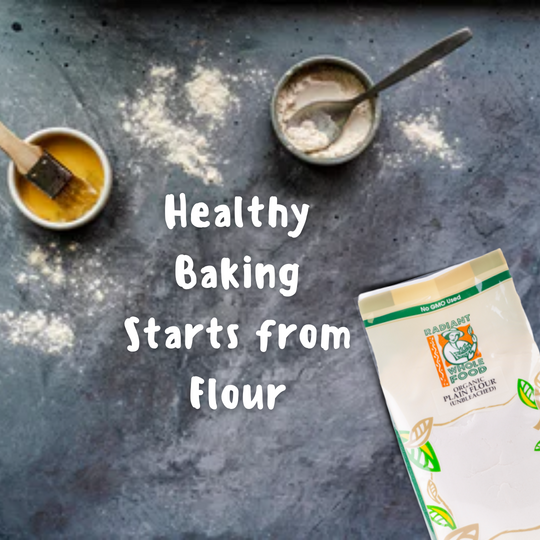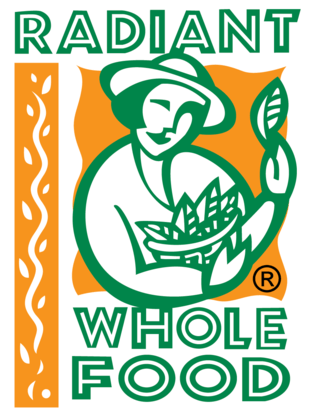
Dec 07 , 2020
Healthy Baking Starts With Flours
HEALTHY BAKING STARTS WITH FLOURS
Going healthy and thinking if you should give up on sweet treats and baking goods? Why not indulge in homemade goodness and give your baking a healthy upgrade instead?
Read on to find out more!

Photo by James Besser on Unsplash
Flour is a pretty obvious baking essential.
When it comes to flour, most of which is derived from whole grains (some flours such as almond flour come from nuts), it is better to eat the whole grains themselves in their unrefined “whole” state as opposed to whole grains that have been refined into flour.
To understand the different components of a grain -
- Bran: the grain’s protective coating. High in fibre and contains B vitamins.
- Starch: Starch contain proteins and carbohydrates.
- Germ: High in fat, B & E vitamins and contains essential elements for future seedling
To understand the difference in flours -
- White flour: All the bran removed, leaving only the starch behind.
- Whole-grain flour: Whole-grain that consists the starch of the grain, the bran and germ. More nutritious than white flour, this type of flour will give your recipes a darker colour and more flavour. Need to add more water to your dough with whole-grain flours, since bran absorbs liquid.
Flours provide the structure in baked goods. Wheat flour contain proteins when mixed with water will interact and form gluten. This elastic gluten will stretch to expand leavening gases during rising. The protein content of a flour affects the strength of a dough.
There are 4 types of wheat flour that are most used in recipes - All-purpose flour, Bread flour, Whole wheat flour and White whole wheat flour. Professional bakers will usually use Whole Wheat flour which create a much dense flavourful baked goods.
Every flour has its own specific taste, aroma, that determine which types are best for your cooking and baking needs
BENEFITS OF ORGANIC FLOURS
Consumers are increasingly aware that organic foods have higher levels of nutrients and antioxidants that can make a difference to their well-being
The term “organic” means that any products labelled as such were produced according to the principles of organic agriculture: with respect for the environment, and with no use of chemicals or animal waste. If you worry about pesticides and synthetic agents used in wheat plants that may present a health risk in the long run, then organic flours should be your best choice now!
Our stone milling process ensures the integrity, quality, flavour & nutritional value in flours. As the stones grind slowly, the germ is not exposed to excessive temperatures that will reduce the oil to oxidize and become rancid.
Organic flours are usually more beige than white. For Unbleached flour means they are not bleached with chemical bleaching agents and has a denser grain & tougher texture. Some companies bleach their flours to be whiter in colour, finer grain & softer texture which fades naturally as it ages.
Whole-wheat bread made from 100% whole-wheat flour is higher in fiber, vitamins, and minerals than breads made from refined wheat.
Getting ready for the festive season and holidays with healthier choices!

Photo by Joyful on Unsplash
Healthy flours are more widely available today than ever before. Here are some selections you can keep in mind:
Wheat flour is in most baked goods you’ll find at bakeries and supermarkets. You can enjoy in homemade breads, muffins, cakes, scones cookies, rolls, pizza dough, pancakes, and waffles.
Sourdough bread is in trend & demand now – A fermentation process that relies on naturally occurring yeast and bacteria to make the bread rise. Best to use whole-wheat flours that give more fiber, iron, and nutrients
Make simple fruit pancakes with Pastry flour to bring cheer to your Christmas morning or a touch of all time Asian favourites wraps – as in Popiah – for family get together.
Get charge with kids during the school break with homemade Pizza, chocolate chip muffins using wheat flour and their favourite toppings to add on.
TIPS ON STORAGE
The best way to store flours will be in a sealed container, stored in a cool dry place and away from the sunlight. Or to place your product in a sealed jar in the freezer.
Not recommended to store flours in the refrigerator, because flour absorbs moisture easily, which may cause it to turn rancid more quickly.
Organic food is good for you, good for farmers and good for our planet.











